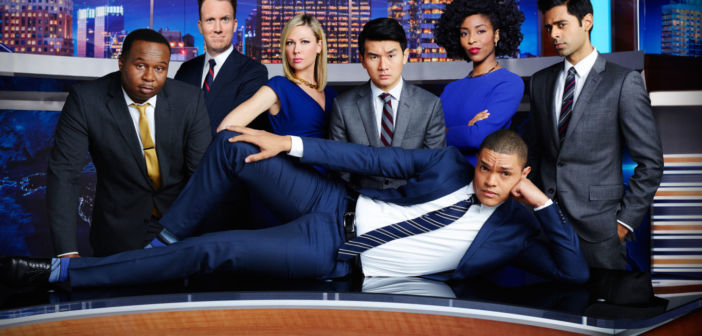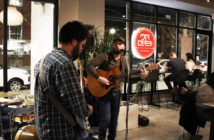In an election season littered with controversy and a voting population that has expressed mostly disappointment in both candidates, voters may sometimes seek stress relief.
They turn to a variety of sources for news, and in the case of political comedy shows, for news that is entertaining.
“Comedy is important to help people keep their sanity in the middle of all of this,” said Roy Wood Jr., a “The Daily Show” correspondent. “It reminds you that you’re not alone in all of this.”
Hasan Minhaj, a “The Daily Show” correspondent, pointed out that more than ever before, political culture is popular culture, leading to an increase in viewership of political comedy shows across the board.
“I think the rising popularity of political satire and its success is we’re basically comedic sympathizers,” Minhaj said. “We take really complicated esoteric information and in 7 1/2 minute acts we’re able to break it down. Our ability to synthesize the information and give it to people is a necessary thing now.”
The 2016 election season has forced voters to confront issues of corruption, racism and sexism, which despite social progress, have proved themselves to be alive and well.
Political comedy shows allow voters to gain an informed perspective on candidates and campaign issues through a less serious light than traditional news sources.
The ability to take serious issues and make jokes about them allows people to feel more comfortable discussing the issues and opens the floor for discussion, Wood Jr. said.
In addition to discussing the more difficult issues, research has shown that political comedy shows have also been successful in increasing public interest in political issues.
“From the amount of research that’s been done in political communication it seems to suggest these shows have had a pretty positive impact on young Americans.” said Anthony DiMaggio, an associate political science professor. “The research has shown that people become more interested in politics, so that’s sort of a side effect of tuning in. The original goal was entertainment but people become more interested in politics.”
DiMaggio also said the primary demographics watching these shows are those ages 18-35. A large benefit of the shows comes in the ability to provide many students with the civic knowledge they may not have received in high school and came to college without.
As a result, he said many viewers proceeded to perform better on surveys that tested their civic and political knowledge. Wood Jr. said this is the best outcome he could hope for as a correspondent.
“The thing that we can do as a show, if nothing else, is empower people with information and do it comedically,” he said.
In a survey of 40 Lehigh students, more than 80 percent of respondents said they felt political comedy shows are important during election season, and 47 percent said they personally have been using political comedy shows to keep up with the 2016 election.
Minhaj joked that from a college perspective, political comedy correspondents were like the “cool history professors.” Wood Jr. added “the cool history teacher who doesn’t wear a tie.”
Minhaj also spoke to the rise of political satire in congruence with a rise in the pursuit of investigative journalism, saying the two were rising together. He said political comedy shows allow people to see the work done by investigative journalists, while providing the information in a way that is consumable and easy to follow through jokes.
In the survey of Lehigh students, more than 90 percent of respondents said they watch political comedy shows for both the comedy and the news value, as opposed to just one or the other.
However, with this emphasis on consuming news from comedy shows comes the concern of many political scientists that consumers may stop looking to traditional news sources for information.
“The vast majority of the research in terms of actual journalism and reporting is being done by traditional journalists,” DiMaggio said, “You really can’t afford to ignore the hard news sources, and a lot of people are. It’s not just a potential negative there, it’s a real one when a lot of these major newspapers are seeing major declines in readership.”
DiMaggio also said while readership of these news sources is declining overall, he isn’t sure political comedy is to blame. He spoke to some of the major benefits of the shows which go beyond in-the-moment knowledge.
He criticized mainstream media outlets for their often lack of criticism of major political leaders and drew attention to the fact that many voters don’t trust these media outlets and the way they report political issues.
He said political comedy programs do a better job of forcing voters to think critically and skeptically.
“It’s superior to traditional news because they oftentimes are more reliant on official sources and aren’t critical enough,” DiMaggio said. “In comparison with the entertainment programs, much of the comedy comes from being critical and skeptical. So that whole idea of socializing people to have critical awareness and to be critical thinkers I think is a lot more evident in these kinds of programs.”
DiMaggio seemed to think the positive outcomes of the shows outweighed the negatives.
“In terms of the overall positive, it’s not just that people are getting stress relief out of the comedy, but they’re learning more about politics than they would otherwise and they’re becoming critical thinkers,” he said.
“The Daily Show with Trevor Noah” will also air a special episode on election night to provide voters with the same sense of comedic relief that has deemed itself essential this election season.






Comment policy
Comments posted to The Brown and White website are reviewed by a moderator before being approved. Incendiary speech or harassing language, including comments targeted at individuals, may be deemed unacceptable and not published. Spam and other soliciting will also be declined.
The Brown and White also reserves the right to not publish entirely anonymous comments.